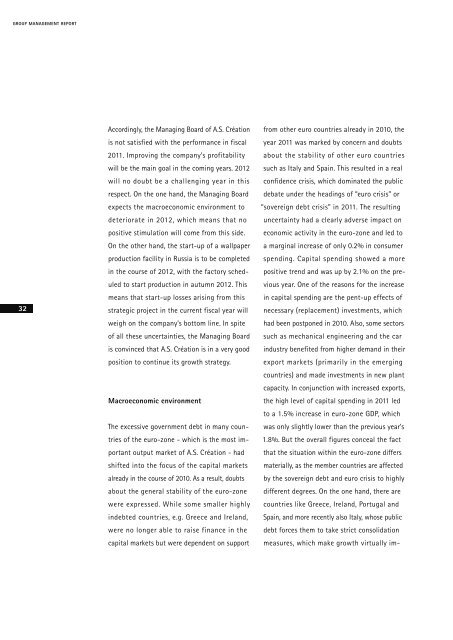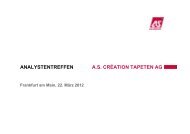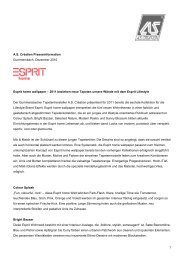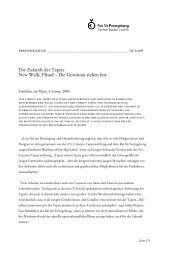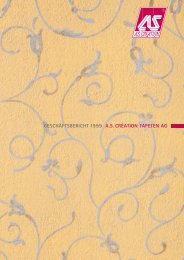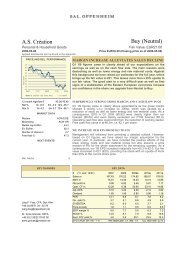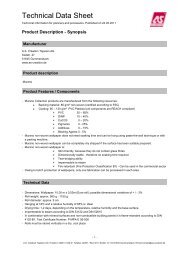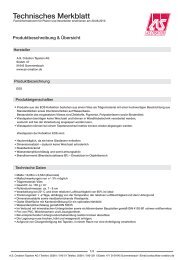ANNUAL REPORT 2011 A.S. CRÉATION TAPETEN AG
ANNUAL REPORT 2011 A.S. CRÉATION TAPETEN AG
ANNUAL REPORT 2011 A.S. CRÉATION TAPETEN AG
Create successful ePaper yourself
Turn your PDF publications into a flip-book with our unique Google optimized e-Paper software.
GROUP MAN<strong>AG</strong>EMENT <strong>REPORT</strong><br />
32<br />
Accordingly, the Managing Board of A.S. Création<br />
is not satisfied with the performance in fiscal<br />
<strong>2011</strong>. Improving the company’s profitability<br />
will be the main goal in the coming years. 2012<br />
will no doubt be a challenging year in this<br />
respect. On the one hand, the Managing Board<br />
expects the macroeconomic environment to<br />
deteriorate in 2012, which means that no<br />
positive stimulation will come from this side.<br />
On the other hand, the start-up of a wallpaper<br />
production facility in Russia is to be completed<br />
in the course of 2012, with the factory scheduled<br />
to start production in autumn 2012. This<br />
means that start-up losses arising from this<br />
strategic project in the current fiscal year will<br />
weigh on the company’s bottom line. In spite<br />
of all these uncertainties, the Managing Board<br />
is convinced that A.S. Création is in a very good<br />
position to continue its growth strategy.<br />
Macroeconomic environment<br />
The excessive government debt in many countries<br />
of the euro-zone - which is the most important<br />
output market of A.S. Création - had<br />
shifted into the focus of the capital markets<br />
already in the course of 2010. As a result, doubts<br />
about the general stability of the euro-zone<br />
were expressed. While some smaller highly<br />
indebted countries, e.g. Greece and Ireland,<br />
were no longer able to raise finance in the<br />
capital markets but were dependent on support<br />
from other euro countries already in 2010, the<br />
year <strong>2011</strong> was marked by concern and doubts<br />
about the stability of other euro countries<br />
such as Italy and Spain. This resulted in a real<br />
confidence crisis, which dominated the public<br />
debate under the headings of “euro crisis” or<br />
“sovereign debt crisis” in <strong>2011</strong>. The resulting<br />
uncertainty had a clearly adverse impact on<br />
economic activity in the euro-zone and led to<br />
a marginal increase of only 0.2% in consumer<br />
spending. Capital spending showed a more<br />
positive trend and was up by 2.1% on the previous<br />
year. One of the reasons for the increase<br />
in capital spending are the pent-up effects of<br />
necessary (replacement) investments, which<br />
had been postponed in 2010. Also, some sectors<br />
such as mechanical engineering and the car<br />
industry benefited from higher demand in their<br />
export markets (primarily in the emerging<br />
countries) and made investments in new plant<br />
capacity. In conjunction with increased exports,<br />
the high level of capital spending in <strong>2011</strong> led<br />
to a 1.5% increase in euro-zone GDP, which<br />
was only slightly lower than the previous year’s<br />
1.8%. But the overall figures conceal the fact<br />
that the situation within the euro-zone differs<br />
materially, as the member countries are affected<br />
by the sovereign debt and euro crisis to highly<br />
different degrees. On the one hand, there are<br />
countries like Greece, Ireland, Portugal and<br />
Spain, and more recently also Italy, whose public<br />
debt forces them to take strict consolidation<br />
measures, which make growth virtually im-


